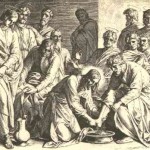Pretty dead things
My daughter, Miranda, loves photography. Currently, she’s taking a photography class, so we often take her to different places around our area so that they can shoot photos. (If you’re interested, you can see some of her photos here. You’ll even find a picture of me.)
The thumbnail attached to this post is one of her pictures. It was taken in Nags Head, NC. I think it’s a beautiful picture. (You can see a larger version of the tree picture here.)
A few days ago, we went to a local “botanical garden” which turned out to be a couple of trails through the woods. While walking the trails, she took pictures of rocks, stumps, and fallen logs, among other things.
Again, many of those pictures are stunning. Currently, my laptop’s desktop background is a photo of a gnarled and twisted stump that she took. The stump has colored striations that are very pretty.
In fact, all of the things that I listed are very pretty: tree, stumps, rocks, fallen logs. But, they have something else in common, too. They’re all dead.
None of them are living. They are beautiful to look at. They have structure and substance. But, they are all dead.
Just something to think about… dead things can be attractive, but they’re still dead.
For I have given you an example
Guy at “The M Blog” wrote a great post called “Acts–description or prescription?” His blog post also started a great discussion in the comments.
As you can tell by the title of his post, Guy and his readers are discussing the question of whether narrative portions of Scripture are only descriptive or if they are both descriptive and prescriptive. The question of normativity (that is, what in Scripture is applicable to the follower of Jesus Christ today, and how is it applicable) is a difficult one. In the comments, you will find people who come down on each side of this debate.
I added my thoughts to the discussion, and I thought would share those thoughts here. Here is my comment on Guy’s post:
This is an important discussion, because you’re asking a question that is typically overlooked.
The answer to what is prescriptive and what is (merely) descriptive is usually answered by a person’s theological tradition or background instead of some hermeneutical or interpretive strategy. Thus, we accept certain things as prescriptive (normative) because we are more reformed, or less reformed, or more baptistic, or less baptistic, or more liturgical or less liturgical.
All of Scripture (from Genesis to Revelation) contains a mixture of genres. One of the most difficult genres to interpret is narrative – which we find primarily in the Gospels and Acts in the New Testament (although there are aspects of narrative in the Epistles and Revelation as well).
For me, John 13:1-15 is helpful for understanding how to interpret narrative. I don’t think Jesus’ remarks in John 13:14-15 apply only to foot washing, and I don’t think they apply only to this particular passage.
Are the narrative passages of Scripture prescriptive (normative) for followers of Christ today? It depends on what you mean by prescriptive. Should we do exactly what those early believers (or Jesus) did? Probably not. Should we learn from their example and live accordingly (you could call this by principle, if you choose)? Yes, I think so.
What do you think? Can John 13:1-15, and especially Jesus’ instructions in John 13:14-15 help us understand how we are to interpret narrative passages of Scripture?
Filling in what is lacking in Christ’s sufferings
Often, when Paul was traveling from place to place, he found himself in need. He found that God would always supply his needs. (Yes, at times he had to learn to live with less. At other times, he had plenty. But, God always supplied what he needed.)
Often, God would supply his needs through other brothers and sisters in cities and towns that he had visited previously. (Interestingly – and not a point in this post – it seems that Paul never accepted support from the people of the city where he was currently working.) In many cases, these brothers and sisters would send that support via the hands of one of their own.
For example, in his letter to the Philippians, Paul recounts a time that the church in Philippi helped him. The Philippians had sent that support via Epaphroditus. This is part of what Paul says about Epaphroditus:
[Epaphroditus] nearly died for the work of Christ, risking his life to complete what was lacking in your service to me. (Philippians 2:30 ESV)
While the Philippians wanted to serve Paul and while they sent support to him, that concern and support was lacking something: a personal, face-to-face touch. The fact that our care and concern is lacking without face-to-face contact and interaction is brought home even more clearly in this passage in Paul’s letter to the Thessalonians:
For what thanksgiving can we return to God for you, for all the joy that we feel for your sake before our God, as we pray most earnestly night and day that we may see you face to face and supply what is lacking in your faith? (1 Thessalonians 3:9-10 ESV)
In this passage, we clearly see that “supply[ing] what is lacking” requires seeing someone face-to-face. Paul understood the importance of that type of personal interaction. Yes, he sent letters (and today he would probably use phone calls, and email, and maybe even Facebook), but something would always be lacking with the person, face-to-face interaction.
Similarly, consider the following passage in Paul’s first letter to the church in Corinth:
I rejoice at the coming of Stephanas and Fortunatus and Achaicus, because they have made up for your absence, for they refreshed my spirit as well as yours. Give recognition to such men. (1 Corinthians 16:17-18 ESV)
Paul was happy because these three brothers “made up for [the Corinthians’] absence” (literally, “filled in what was lacking” as in the passage above). All of the Corinthians believers could not be with Paul. But, Stephanas, Fortunatas, and Achaicus traveled to meet Paul, and thus were able to spend face-to-face time with him. By their presence and their mutual service, they filled in what was lacking in the care and concern that the church in Corinth had for Paul.
This brings me to a very interesting passage in Colossians:
Now I rejoice in my sufferings for your sake, and in my flesh I am filling up what is lacking in Christ’s afflictions for the sake of his body, that is, the church… (Colossians 1:24 ESV)
Paul’s sufferings somehow filled in what was lacking in Christ’s own sufferings. And this “filling in” was on behalf of the church. Certainly, in some ways and in some aspects, Christ’s sufferings are completely sufficient – i.e., there is nothing lacking. However, in at least one aspect, something is lacking in Christ’s sufferings.
What’s lacking? By examining the passages above, it seems that it’s the personal, face-to-face interaction that is missing. While Jesus is still present and real and living, he is not physically present and the believers in the Colossae (and other places) did not see him face-to-face. In this context, Paul is talking about his service for Christ for the sake of the church. Paul’s own sufferings and afflictions and hard work (“toil”) were a personal, physical, face-to-face representation of the sufferings of Christ and, thus, “filled in what was lacking” in the sufferings of Christ.
The people around us also need a personal, physical, face-to-face representation of the love and service and sufferings of Christ. We are here to “fill in what is lacking” in Christ’s sufferings for them.
Dear “Preacher”… were you serious?
Dear “Preacher,”
I don’t know your name or what you call your church. I only know you by the title “Preacher,” which is what the young lady called you. I met her at another local church (where she is not a member) that was hosting a food pantry.
When I asked how I could pray for her, she asked me to pray for her upcoming marriage. She said she was getting married because her “preacher” told her that God was punishing her for her sins and if she got married things would be better for her.
Were you serious? Or did she misunderstand you? Please tell me that she misunderstood you.
By the way, she did not want to hear about God’s love either. Whenever I told her that God loved her, she simply crossed her arms and said, “My preacher told me that God is wrath, and that I’m under the wrath of God because I’m living with and sleeping with a man who is not my husband.”
Were you serious? Or did she misunderstand you?
You see, I tried to talk to her about sin, and about how sleeping with her boyfriend is a sin issue of the heart and changing her marital status will not change her heart. I told her that marriage is a wonderful thing and that I am so glad that I’ve been married for over twenty years.
I tried to tell her that God wanted to change her from the inside out. Otherwise, I said that marriage would only add to her problems, not help them. Again, she crossed her arms and told me, “My preacher said that God would bless me if I got married.”
Were you serious? Did she misunderstand you?
You see, I do believe that marriage is a blessing from God. But marriage certainly doesn’t make all your troubles go away, and marriage doesn’t change our heart issues. Sometimes marriage even multiples our heart issues.
So, Preacher, please tell me that this young lady misunderstood you. And, while you’re at it, will you tell her that God loves her and that only he can change her? The guilt is killing her… the same guilt that God himself canceled through Jesus’ cross. You see, I tried to explain it to her, but she won’t listen to anyone else… only her “Preacher.”
Thanks for listening,
Alan
Maturity and Education
Two and a half years ago, I wrote a post called “Maturity and Education” as part of a synchroblog on “Maturity in the Light of our Faith.” Unfortunately, many in the church today equate education with spiritual maturity. I see it often in a seminary environment. I know some very mature people who are not formally educated, and I know some very educated immature believers. We must learn to separate them two, especially when it comes to recognizing leaders.
——————————————————————–
This post is part of a monthly synchroblog. The topic of this month’s synchroblog is “Maturity in the Light of our Faith”.
A few weeks ago, I wrote a post called “Mutual Hermeneutics“. In that post, I started a discussion about biblical interpretation, and the tendency of modern believers to place the responsibility of interpreting Scripture in the hands of trained professionals. In a follow-up post called “Toward Mutual Hermeneutics“, I made some suggestions that I think would help believers move from a professional-only hermeneutic to mutual hermeneutics.
In the comments of the second post, David from “Love Each Stone” started a good discussion concerning the relationship between education and spiritual maturity. David suggested in one comment that “The contrast and comparison between “mature believers” and those with “training and expertise” is an interesting discussion that would probably be worth a whole separate post”.
A few days later, I found myself consider the topic of maturity again – this time for this synchroblog. Originally, I wanted to write a post on the topic of the role of the church meeting and edification in spiritual maturity. I am very interested in this topic, and I’ll probably write a blog post (or perhaps a series) on this topic later. For now, though, I wanted to continue the discussion on the relationship between training or education and spiritual maturity.
Let me start my stating that I teach in a college part time. When I finish my PhD – hopefully within the next calendar year – I hope to find a job teaching full time. I am not against education. I believe that education can be good, helpful, and important. However, education is not the same as discipleship, nor is education the same as spiritual maturity. And, I think that modernity has equated (or misunderstood) education for spiritual maturity to the detriment of the church.
Let me start by quickly examining a passage of Scripture that is often used to defend the necessity of education:
Study to shew thyself approved unto God, a workman that needeth not to be ashamed, rightly dividing the word of truth. (2 Timothy 2:15 KJV)
I quoted the KJV here because it is the only major English translation to translate the command as “Study” (other early English translations also used “study”: the Bishops Bible of 1595 and Tyndale’s translation of 1534). Yet, that word “Study” has stuck in our (or at least mine and those I’ve talked with) memory and affected the way we understand what Paul said. Now, look at the ESV:
Do your best to present yourself to God as one approved, a worker who has no need to be ashamed, rightly handling the word of truth. (2 Timothy 2:15 ESV)
Thus, Paul was not calling Timothy (and others) to study, but to diligence. The difference is in the change of meaning in the word “study”. Similarly, Paul was not telling Timothy to study the Bible in order to be approved, but to do his best (be diligent) in the way he lives according to the gospel. (For “rightly handling” see Prov 11:5 where it is translated “keeps his way”. For “word of truth” = “gospel” for Paul, see Eph 1:13 and Col 1:5.)
So, right away, let’s get this passage out of our system. Paul was not telling Timothy to be educated by studying the Bible. He was telling Timothy to make every effort to live his life according to the gospel. In so doing, Timothy would be like an approved work who has no need to feel ashamed.
But today, we place such an emphasis on education that it has become almost synonymous with spiritual maturity. When someone graduates from Bible school or seminary, they are often hired right away by church organizations, with the assumption that the degree indicates maturity. Since the church does not know the individual personally, they only have the degree and a few hours of acquaintance.
However, while a degree may indicate a certain amount of knowledge – hopefully – the degree does not indicate spiritual maturity. The degree does not indicate that the person demonstrates love toward those who are “unloveable”. It does not indicate that the person knows how to deal with “opponents” with grace, patience, and gentleness. The degree does not tell us that the person is hospitable or willing to share what God has provided. Even passing classes in theology, hermeneutics, New Testament, Old Testament, Hebrew, and Greek does not indicate that a person knows how to interpret the Scriptures, much less live according to them. Graduation does not make a person spiritually mature.
Of course, our church system is based on the assumption that an educated person is spiritually mature. Most church leaders (pastors) would not spend the time getting to know people and letting the people get to know them before they accept a position in a church organization. Similarly, for the most part, the people would not wait to determine a person’s spiritual maturity level before recognizing this person as a leader. We expect our leader’s to be ready-made by Bible colleges and seminaries.
Its time to move beyond the assumption that education equals spiritual maturity. It may mean that the system has to change – so be it. The church needs leaders who are spiritually mature more than they need educated leaders. Again, I’m not disparaging education. Instead, I’m simply pointing out that we need spiritually mature pastors more than we need educated pastors.
What happened to the “disciples”?
So, this post is related to my previous series on disciples and discipleship. But, I decided not to make it part of the series. Perhaps it should have been, but it’s not. So sue me.
The various Greek terms related to “disciples” (μαθητηÌÏ‚ – mathetes) and “making disciples” (μαθητευÌω – matheteuo) are found many, many times in the Gospels and in Acts. However, once you move to the epistles (Pauline and General) or Revelation, the terms are not found at all. Not once.
Now, maybe that doesn’t mean much to you, so let me spell it out a little more. The verb μαθητευÌω (matheteuo – “be a disciple” or “make a disciple”) is found four times in the Gospels and Acts. The noun μαθητηÌÏ‚ (mathetes – “disciple“) is found 261 times in the Gospels and Acts. But, in Paul’s Epistles, the General Epistles, and Revelation, these terms are not found one time. Again… not once.
So, what happened to the “disciples”?
Now, some have suggested that the term “disciple” was reserved for those who spent time with Jesus face-to-face, that is, when he was physically on the earth. However, that doesn’t fit with the evidence found in the Gospels and Acts. For example, Acts 6:1 says that the number of “disciples” was increasing, indicating that there were now disciples who had not followed Jesus. Similarly, in Acts 19:9, while Paul was in Ephesus, he moved from the synagogue to the Hall of Tyrannus because of problems with the Jews. He took some “disciples” with him. Obviously, these disciples had not spent time with Jesus when he was physically on the earth.
So, what happened to the “disciples”?
Could the use of the term “disciple” be related to an author’s preference? That’s possible, but only if the Gospel of John and the Epistles of John were written by different authors. Similarly, authorial preference of the use of “disciple” would also indicate that Luke could not have written Hebrews. However, we know that Luke and Paul were close friends and traveled together often. Yet, Luke used the term “disciple,” but Paul never did (at least, not in his extant letters).
So, what happened to the “disciples”?
What about a timing issue? Could the use of the term “disciple” be related to a certain time period in church history (i.e., when certain books were written). Unfortunately, this doesn’t work either. While scholars disagree about the specific dates that each book was written, it seems that the writing dates of the books that use the term “disciple” are interspersed with the writing dates of the books that do not use the term “disciple.” (Interestingly, the term “disciple” shows up again in some of the writings referred to as the “Apostolic Fathers” – Ignatius’ letters, Epistle of Diognetus, and Martyrdom of Polycarp – but not in other writings from the same time period.)
So, there doesn’t seem to be any obvious reason as to why the Gospels and Acts use the “disciple” terms but the other books of the New Testament do not.
I think the most likely explanation has to do with author and recipients. For example, it seems that Paul preferred the terms “servant” or “slave,” and he used those in places where you might expect “disciple.”
What do you think?
Opportunity and Clarity
As you probably know (if you don’t, you will in a few seconds), I’ve been studying the book of Colossians. While I’ve read the book several times, this is the first in depth study that I’ve done.
I’ve been greatly encouraged and challenged as I’ve studied Colossians. Plus, I’ve had a few opportunities to speak to others who are studying it at the same time. (Our church will study it together beginning this weekend.)
For one thing, I love how Paul seems so real in this letter. He doesn’t seem like a super-saint (wearing his super suit). Instead, he seems like a regular person, who knows that he’s been called by God so he trusts completely in God’s ability to empower him as he works.
(By the way, I don’t think Paul seems larger-than-life in the other books of the New Testament. I think he’s presented that way by teachers at times, though.)
Consider this passage in which Paul asks the Colossians to pray for him and his team:
Continue steadfastly in prayer, being watchful in it with thanksgiving. At the same time, pray also for us, that God may open to us a door for the word, to declare the mystery of Christ, on account of which I am in prison – that I may make it clear, which is how I ought to speak. (Colossians 4:2-4 ESV)
Paul asks the Colossians to pray that he would have opportunities to speak the message of Christ to others, even while he is in prison. And, he wants them to pray that he would speak that message clearly. (Apparently, he occasionally did not present the gospel clearly, even though he knew he ought to speak it clearly.)
This is a real person with real concerns and real requests. Even the great missionary needed others to pray that he would have opportunities to share the gospel and that he would do so clearly.
If you think about it… would you pray the same for me? Thanks.
“Everything of significance you will learn from experience”
Dave Black is my PhD mentor at Southeastern Baptist Theological Seminary. He is a professor at a seminary, teaching New Testament and Greek. If you’ve read my blog for more than a day or two, you probably already know this. But, I make that statement for a reason.
So, some may be surprised by what he wrote this morning on his blog (Wednesday, March 9, 2011 at 11:26 a.m.).
Look at the paragraph under the picture of George Armstrong Custer:
Although I am a classroom teacher by profession and have been at it for some 34 years, I assure you, everything of significance you will ever learn you will learn from experience, not in a classroom. The crucible of life is realistic, nontechnical (usually), and free from perfectionistic demands. Essentially, Christianity is a Way of life. Biblical principles work. If they didn’t, I would never waste your time or mine by writing this blog. Life is a place for biblical truth to be fleshed out, regardless of our educational status or attainments. It’s lengthy, costly, messy — and just plain hard work. But when you consider the alternative, it’s well worth the effort.
Why would a seminary professor write something like that? I think it’s because he understands that our spiritual growth and discipleship is more important than defending his position as a professor.
Professors and classes and do good things. But, like Dave Black wrote, “[E]verything of significance you will ever learn you will learn from experience, not in a classroom.”
So, I have a question for my fellow students (and even for professors)… where are you doing most of your learning?
A Disciple of Jesus Christ: True Disciples
In the first post of this series (“A Disciple of Jesus Christ: Introduction“), I defined a few terms related to “disciples” in Scripture. As we saw, the terms have a wide range of meaning. Also, in the second post (“A Disciple of Jesus Christ: Bounds“), I observed that John uses the term “disciple” in various ways corresponding to the ranges in the definitions.
However, even though John uses the term “disciple” to refer to people in both a positive and a negative way, it is clear that he is encouraging his readers toward being a certain type of disciple, which I will call a “true disciple.”
I get the term from this passage in John:
So Jesus said to the Jews who had believed in him, “If you abide in my word, you are truly my disciples, and you will know the truth, and the truth will set you free.” (John 8:31-32 ESV)
Notice that this statement was spoken to Jews “who believed in him.” Was this “saving faith,” or simply a belief in his ability to perform certain miracles or make certain claims? With John, it is always difficult to tell with certainty. However, if you keep reading in John 8 following the passage above, you will see that these Jews “who believed in him” are not shown in a positive light.
So, what does Jesus say about “true disciples” in the passage above? He says that “true disciples” are those who are abiding (dwelling, remaining) in his word (or message). What does this mean? Well, in the next passage, Jesus explains that he is talking about being freed from sin. While the Jews claim that they are “children of Abraham,” Jesus ignores their statement for a moment and explains:
Jesus answered them, “Truly, truly, I say to you, everyone who commits sin is a slave to sin. The slave does not remain in the house forever; the son remains forever. So if the Son sets you free, you will be free indeed. (John 8:34-36 ESV)
Jesus then returns to their statements about being “children of Abraham,” and he explains that even the offspring of Abraham are slaves to sin. (Of course, the Jews do not like this very much…)
Thus, “abiding in my word” in this passage seems to indicate trusting Jesus’ word that they would be forgiven of their sins. “True disciples,” then, live with the understanding that their sins are forgiven, that they are no longer slaves to sin, and that they are now living a sons of God and will remain children of God forever.
Later in John, Jesus makes another claim about those who are truly his disciples:
“By this all people will know that you are my disciples, if you have love for one another.” (John 13:35 ESV)
So, besides a recognition and acceptance that they have been forgiven (and continuing to live in that state), Jesus’ disciples also demonstrate love for one another. In fact, it is by their love for one another that other people will recognize them. (Perhaps this is why John continuously exhorts his readers to “love one another.”)
In another “abiding” passage (John 15), Jesus explains another “mark” of his true disciples:
By this my Father is glorified, that you bear much fruit and so prove to be my disciples. (John 15:8 ESV)
“Bearing fruit” is an important metaphor in the Gospel of John (John 4:36-38 and John 12:24-25) and especially in John 15 (John 15:2, John 15:4, John 15:5, John 15:8, and John 15:16). Associating “bearing fruit” with spiritual growth is too limited an association. Similarly, associating “bearing fruit” with “conversions” is also too limited. In John, the idea of “bearing fruit” seems to be similar to the idea of the increase of the kingdom of God as found in the Synoptic Gospels (Matthew, Mark, Luke).
Thus, disciples are interested in advancing the kingdom of God, which glorifies our Father and again shows that we are Jesus’ disciples.
Certainly there are other aspects of being a “true disciple” that could be brought up at this point. However, these are the three points that John mentions. A “true disciple” lives as a child of God in the forgiveness of God, demonstrates love to other disciples in a manner that the world recognizes and notices, and seeks to advance the kingdom of God.
Interestingly, Jesus is also shown doing these three things while he is physically on the earth. He lives as the son of God recognizing his special relationship with God that is not marred by sin. He loves people unconditionally, and those around him notice. He seeks to advance God’s kingdom through word and through deed.
Thus, when we are a “true disciple” we are following in Jesus’ footsteps, doing the things that he would be doing.
An active theology
Dan at “The Ekklesia in Southern Maine” has written a post about “Real Theology: or what you really believe.”
The post is about the difference between confessed or professed theology versus actual theology. Dan says that you live what you really believe. Thus, your theology is more clearly viewed in your life than in your words (spoken or written).
But, Dan isn’t pointing his finger at you. Nope. He’s turning the tables on himself.
He writes:
I think that is where it really comes down. That is where I struggle in my daily decisions: I don’t always believe that following God is better than not following Him. Why else would I prefer not to obey if, as I say, I believe that His rewards are greater than the rewards of my sinful selfish actions. It is a simple process: I am presented with options, I weigh the outcome of each option, I decide which outcome I would prefer and make my choice. Now, if I really believe, as I state, that the rewards of obedience to God are the greatest possible rewards, then the choice would be simply a matter of asking which option glorifies God, is an act of obedience to God, or fulfills God’s desire for His followers. Sometimes that question is difficult, but many times it is easy, yet I still choose in opposition to it. At that point it is clear that I prefer the outcome of the option that is in opposition to my stated Theology, and at that point my Real Theology is made clear.
I agree with Dan. What you truly believe is evident in the way that you live your life.










